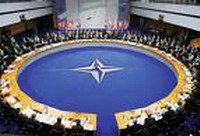Russia accuses NATO of "muscle-flexing" near Russia's frontiers
Russia accused NATO of "muscle-flexing" near Russia's border and now is going to suspend its obligations under a key European arms treaty.

Vladimir Putin's angry statement came amid tensions between Russia and the West, and it reflected the increasingly assertive posture taken by the Kremlin in the run-up to Dec. 2 parliamentary elections.
"In violation of previous agreements, military resources of NATO members are being built up next to our borders," Putin told a meeting of military officials. "Of course, we cannot allow ourselves to remain indifferent to this obvious muscle-flexing."
Putin also gave senior generals a dressing-down over the military's poor living conditions - remarks apparently aimed at winning the hearts of military voters less than two weeks before the election.
Putin's decision to lead the ticket of the main pro-Kremlin United Russia party is expected to help the party tighten its overwhelming control of parliament's lower chamber.
Disputes between Russia and the West have multiplied in recent years, with military disagreements topping the list. U.S. plans to establish missile defense sites in Eastern Europe have provoked a harsh reaction from Moscow, which has long been concerned about the expansion of NATO into former Soviet republics and former Soviet-bloc states.
Putin said the suspension of Russia's obligations under the Conventional Forces in Europe Treaty, or CFE, which limits the deployment of tanks, aircraft and heavy conventional weapons across the continent, was part of Russia's response.
Both houses of the Russian parliament have endorsed the suspension, which is scheduled to take effect Dec. 12. Putin justified the suspension by pointing to NATO nations' failure to ratify an amended version of the treaty.
"We won't observe any obligations unilaterally," Putin said, frowning. "Our partners haven't ratified the amended version of the treaty, and some haven't even signed it. Shall we do it unilaterally for years?"
NATO spokesman James Appathurai dismissed Putin's talk of NATO's muscle-flexing.
"All NATO members continue to abide by the restrictions on the numbers and movements of equipment like tanks and aircraft which the CFE treaty requires, even if it hasn't entered into force, so there is no need to talk about muscle-flexing," he said.
"NATO allies would certainly regret if Russia were unilaterally to impose a moratorium on its participation and adherence to the CFE treaty," he said.
The 1990 Conventional Forces in Europe Treaty, which originally set limits on the weapons of NATO and Warsaw Pact countries, was revised in 1999. Russia says the old version has lost relevance because former Soviet satellites have joined NATO.
Russia ratified the updated treaty in 2004, but the United States and other NATO members have refused to follow suit, saying Moscow first must fulfill obligations to withdraw forces from Georgia and from Moldova's separatist Trans-Dniester region. The Kremlin has said there should be no link.
Relations between the United States and Russia were already strained over the U.S. plans to build missile defense bases in Poland and the Czech Republic. Putin said the U.S. plan would erode Russia's nuclear deterrent and dismissed Washington's claim that the missile shield was necessary to counter a missile threat from Iran.
As a counterproposal, Putin offered the United States joint use of a Russian-operated radar in Azerbaijan. But U.S. officials said the radar couldn't be considered as a replacement for the European sites.
"Regrettably, Russian proposals about the creation of a joint missile defense system with equal access for all its participants have remained unanswered," Putin said Tuesday.
He warned that Russia would increase the combat-readiness of its strategic nuclear forces to ensure a "swift and adequate response to any aggressor."
Putin has said previously that Moscow could respond to the U.S. missile shield by targeting prospective U.S. missile defense sites in Europe.
Russian officials have also warned that Russia could pull out of the Intermediate-Range Nuclear Forces Treaty, a landmark document signed by Soviet leader Mikhail Gorbachev and U.S. President Ronald Reagan in 1987 that banned the entire class of medium-range missiles.
However, the Kremlin hasn't taken any action on the pact, apparently fearing a strong U.S. response.
"We shouldn't be in a hurry to withdraw from this treaty," Gen. Yuri Baluyevsky, the chief of Russia's military General Staff was quoted by news agencies as saying Tuesday. "We should try to pull other nations developing such missiles into this pact."
Subscribe to Pravda.Ru Telegram channel, Facebook, RSS!


